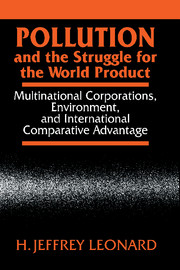 Pollution and the Struggle for the World Product
Pollution and the Struggle for the World Product Published online by Cambridge University Press: 05 January 2012
The classical law of comparative advantage sought to demonstrate that productive resources in all countries could be more efficiently employed if each country, through the exchange of goods and raw materials, specialized in producing the few goods and raw materials that it could produce most proficiently. A more neutral way of thinking about the concept of comparative advantage is that it describes the array of social, economic, and political forces that account for the general export and import patterns prevailing between nations. In this sense, all the other bodies of theory discussed in this and subsequent chapters contribute to an understanding of comparative advantage.
Although much of its original elegance has been muddled as a result of empirical testing, the theory of comparative advantage put forth by Eli Heckscher and Bertil Ohlin remains the highest level of generality in explaining patterns of world trade. In essence, the Heckscher-Ohlin theory holds that differences in comparative advantage among countries are explained by different relative costs for the separate factors of production; these relative factor costs are determined by how well endowed each nation is with those factors. Because different goods require different factor proportions in their manufacture, countries will tend to export those goods that use large portions of their more abundant factors and import those that depend upon their scarce factors of production.
To save this book to your Kindle, first ensure [email protected] is added to your Approved Personal Document E-mail List under your Personal Document Settings on the Manage Your Content and Devices page of your Amazon account. Then enter the ‘name’ part of your Kindle email address below. Find out more about saving to your Kindle.
Note you can select to save to either the @free.kindle.com or @kindle.com variations. ‘@free.kindle.com’ emails are free but can only be saved to your device when it is connected to wi-fi. ‘@kindle.com’ emails can be delivered even when you are not connected to wi-fi, but note that service fees apply.
Find out more about the Kindle Personal Document Service.
To save content items to your account, please confirm that you agree to abide by our usage policies. If this is the first time you use this feature, you will be asked to authorise Cambridge Core to connect with your account. Find out more about saving content to Dropbox.
To save content items to your account, please confirm that you agree to abide by our usage policies. If this is the first time you use this feature, you will be asked to authorise Cambridge Core to connect with your account. Find out more about saving content to Google Drive.